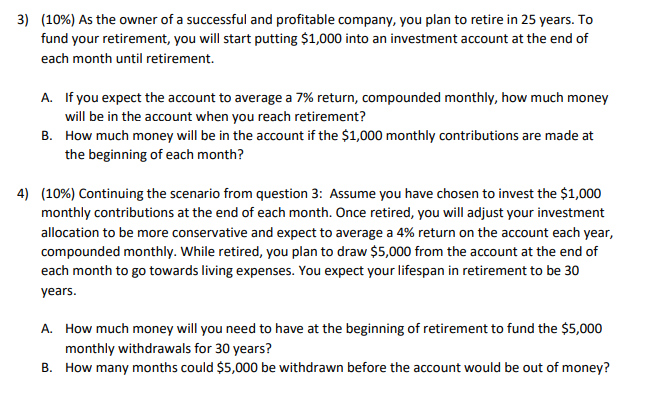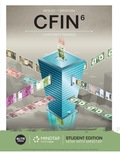Continuing the scenario from question 3: Assume you have chosen to invest the $1,000 monthly contributions at the end of each month. Once retired, you will adjust your investment allocation to be more conservative and expect to average a 4% return on the account each year, compounded monthly. While retired, you plan to draw $5,000 from the account at the end of each month to go towards living expenses. You expect your lifespan in retirement to be 30 years. A. How much money will you need to have at the beginning of retirement to fund the $5,000 monthly withdrawals for 30 years? B. How many months could $5,000 be withdrawn before the account would be out of money?
Continuing the scenario from question 3: Assume you have chosen to invest the $1,000 monthly contributions at the end of each month. Once retired, you will adjust your investment allocation to be more conservative and expect to average a 4% return on the account each year, compounded monthly. While retired, you plan to draw $5,000 from the account at the end of each month to go towards living expenses. You expect your lifespan in retirement to be 30 years. A. How much money will you need to have at the beginning of retirement to fund the $5,000 monthly withdrawals for 30 years? B. How many months could $5,000 be withdrawn before the account would be out of money?
Chapter11: Capital Budgeting Decisions
Section: Chapter Questions
Problem 3PB: Use the tables in Appendix B to answer the following questions. A. If you would like to accumulate...
Related questions
Question
Continuing the scenario from question 3: Assume you have chosen to invest the $1,000
monthly contributions at the end of each month. Once retired, you will adjust your investment
allocation to be more conservative and expect to average a 4% return on the account each year,
compounded monthly. While retired, you plan to draw $5,000 from the account at the end of
each month to go towards living expenses. You expect your lifespan in retirement to be 30
years.
A. How much money will you need to have at the beginning of retirement to fund the $5,000
monthly withdrawals for 30 years?
B. How many months could $5,000 be withdrawn before the account would be out of money?

Transcribed Image Text:3) (10%) As the owner of a successful and profitable company, you plan to retire in 25 years. To
fund your retirement, you will start putting $1,000 into an investment account at the end of
each month until retirement.
A. If you expect the account to average a 7% return, compounded monthly, how much money
will be in the account when you reach retirement?
B. How much money will be in the account if the $1,000 monthly contributions are made at
the beginning of each month?
4) (10%) Continuing the scenario from question 3: Assume you have chosen to invest the $1,000
monthly contributions at the end of each month. Once retired, you will adjust your investment
allocation to be more conservative and expect to average a 4% return on the account each year,
compounded monthly. While retired, you plan to draw $5,000 from the account at the end of
each month to go towards living expenses. You expect your lifespan in retirement to be 30
years.
A. How much money will you need to have at the beginning of retirement to fund the $5,000
monthly withdrawals for 30 years?
B. How many months could $5,000 be withdrawn before the account would be out of money?
Expert Solution
This question has been solved!
Explore an expertly crafted, step-by-step solution for a thorough understanding of key concepts.
This is a popular solution!
Trending now
This is a popular solution!
Step by step
Solved in 2 steps with 2 images

Knowledge Booster
Learn more about
Need a deep-dive on the concept behind this application? Look no further. Learn more about this topic, finance and related others by exploring similar questions and additional content below.Recommended textbooks for you

Principles of Accounting Volume 2
Accounting
ISBN:
9781947172609
Author:
OpenStax
Publisher:
OpenStax College

EBK CONTEMPORARY FINANCIAL MANAGEMENT
Finance
ISBN:
9781337514835
Author:
MOYER
Publisher:
CENGAGE LEARNING - CONSIGNMENT


Principles of Accounting Volume 2
Accounting
ISBN:
9781947172609
Author:
OpenStax
Publisher:
OpenStax College

EBK CONTEMPORARY FINANCIAL MANAGEMENT
Finance
ISBN:
9781337514835
Author:
MOYER
Publisher:
CENGAGE LEARNING - CONSIGNMENT


